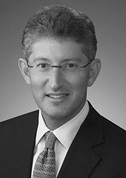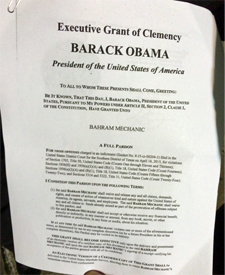© 2015 The Texas Lawbook.
By Mark Curriden
(Jan. 18) – Texas trial lawyer David Gerger received a call late Friday afternoon from senior officials at the U.S. Department of Justice telling him to be at the Federal Detention Center in downtown Houston at 5:30 a.m. to meet with his client who was jailed for violating the U.S. government’s ban on doing business with Iran.
Details were limited, though Gerger had heard rumors for weeks that President Obama might pardon his client, Khosrow Afghani, and two of his Iranian business associates in connection with the recent nuclear truce signed by the two countries late last year.
From before sun up in Houston Saturday to nearly the same time the next morning, Gerger, Afghani and the others waited inside the federal prison on Texas Street as their potential freedom played out on CNN.

“For 23 hours Saturday, there were a lot of false starts and dashed hopes,” says Gerger, who is a partner at Quinn Emanuel in Houston, who represented Enron CFO Andrew Fastow.
Afghani, Bahram Mechanic and Tooraj Faridi were arrested last April for selling millions of dollars of U.S. technology to Iran in violation of U.S. trade sanctions. The trio are Iranians who have dual citizenship in the U.S. and owned a Houston surge protection sales business called Smart Power Systems that operated in both countries.
The three faced trial later this year in federal court in Houston, where they could have received up to seven years in prison if they were found guilty.
When Gerger and lawyers for the other two men arrived at the prison, they were told an announcement could happen at any moment. Anticipation was high. The three Houston defendants were among seven Iranians the U.S. prepared to release from prison if Iran released four Americans.
“There aren’t many presidential pardons that come before a trial, before a conviction,” says Joel Androphy, a Houston lawyer who represents Mechanic. “It’s Richard Nixon, our clients and not many others.”
Gerger and Androphy, in separate interviews with The Texas Lawbook, say they were confident they would have gotten “not guilty” verdicts for their clients if the cases had gone to trial. Both lawyers say there was never even a hint that any of the three men were involved with any kind of terrorist activity.
“The government’s case has many flaws,” says Gerger. “The sanctions are very complicated and the prosecution really stretched the interpretation of the sanctions to bring this case. He was selling products that you can buy in any supply store in Iran.
“Freeing Afghani is the right thing to do,” he says. “My client is a 72-year-old businessman who was in business before the revolution and became a U.S. citizen so he could spend more time here with his family and son, who live here.”
Androphy says the federal government “created an aura of fear and hysteria” around the case.
Gerger and Androphy say that while no government official said it aloud, it was clear that the only thing keeping their clients behind bars was the fact that the four U.S. citizens had not left Iran yet.
As the hours mounted, the lawyers gathered in the office of the warden to watch television.

“The only dispute was over what we watched on TV,” says Joel Androphy. “Most people wanted to watch CNN, but I kept switching the channel to ESPN or to watch the Patriots game.
“We kept hearing 10 more minutes, 10 more minutes,” he says.
Then, at 4:45 a.m., just two hours after CNN announced that the four U.S. prisoners had departed Iran, Warden Mike Pearce handed the lawyers a two-page document with the words “Executive Grant of Clemency” in large bold letters. It had President Obama’s signature.
Afghani, Mechanic and Faridi were free to go. All charges would disappear.
Gerger and Androphy say their clients were thrilled to be able to go to their homes in Houston, where they plan to stay.
“Afghani is a kind, peaceful man and it was painful to see him in prison,” Gerger says. “He plans on spending some precious time with his family and getting his first really good cup of coffee in a long time. This was absolutely the right result.”
© 2014 The Texas Lawbook. Content of The Texas Lawbook is controlled and protected by specific licensing agreements with our subscribers and under federal copyright laws. Any distribution of this content without the consent of The Texas Lawbook is prohibited.
If you see any inaccuracy in any article in The Texas Lawbook, please contact us. Our goal is content that is 100% true and accurate. Thank you.
